FREE QUOTE Helpful Tips5 min read What type of sofa do you have in your house? Most of you may have fabric sofas as this is the most popular type of sofas and the reasons are quite apparent. Fabric couches can easily match with other appliances like tables and rugs in the living room. More […]
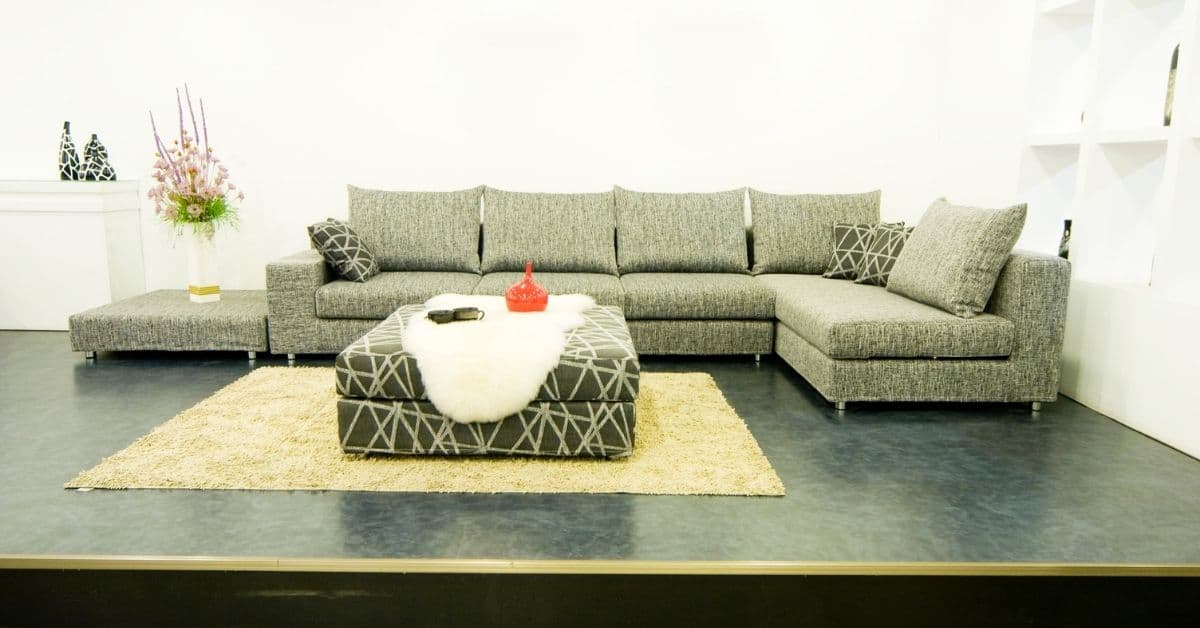
Helpful Tips5 min read
What type of sofa do you have in your house? Most of you may have fabric sofas as this is the most popular type of sofas and the reasons are quite apparent. Fabric couches can easily match with other appliances like tables and rugs in the living room.
More importantly, fabric sofas are more affordable than other kinds such as leather couches. Additionally, the variety of couch fabric options available makes them a versatile choice for any decor. However, nothing is perfect, so are fabric sofas. A major shortcoming of fabric couches is that they are hard to clean. For a deeper clean, consider using an upholstery cleaning machine after wiping the surface.
If you find a speck on the couch surface and try to scrub it off, instead of disappearing, the spot may become larger and your sofas could also be damaged. Some fabric sofas cannot even be cleaned by water as water will penetrate into the sofa and damage them.
The good news is, there are still good ways to polish the sofas without water and that is the purpose of today’s article. Sparkling and Beyond will give you some easy cleaning tips to make your fabric sofas stay nice and tidy.
As we mentioned before, some fabric couches, including their couch cushions, cannot be cleaned by water. The more concrete reasons are that when water seeps into the couches, it will dampen and ruin the cushion inside the sofas as well as the wooden parts like columns and frames.
If this happens, it is difficult to repair the sofas and you can only replace them with new ones. Therefore, it is important to find the proper way to clean** your fabric couches**.
Fortunately, the answer usually lies on the instruction tags of your sofa.
If the tag marks “W”, this means your sofa can be cleaned with water.
If the tag shows “WS”, this means you can use solvent-based cleaners or a small amount of water to clean.
On the other hand, a label “S” suggests you cannot use water at all.
Also, the label “X” means that both water and solvent-based cleaner should not be used for cleaning.
If your sofas are not allowed to be cleaned by water, don’t be frustrated. 3 alternative ways to polish your couches are baking soda, vinegar or alcohol – these products can properly polish your sofas without water.
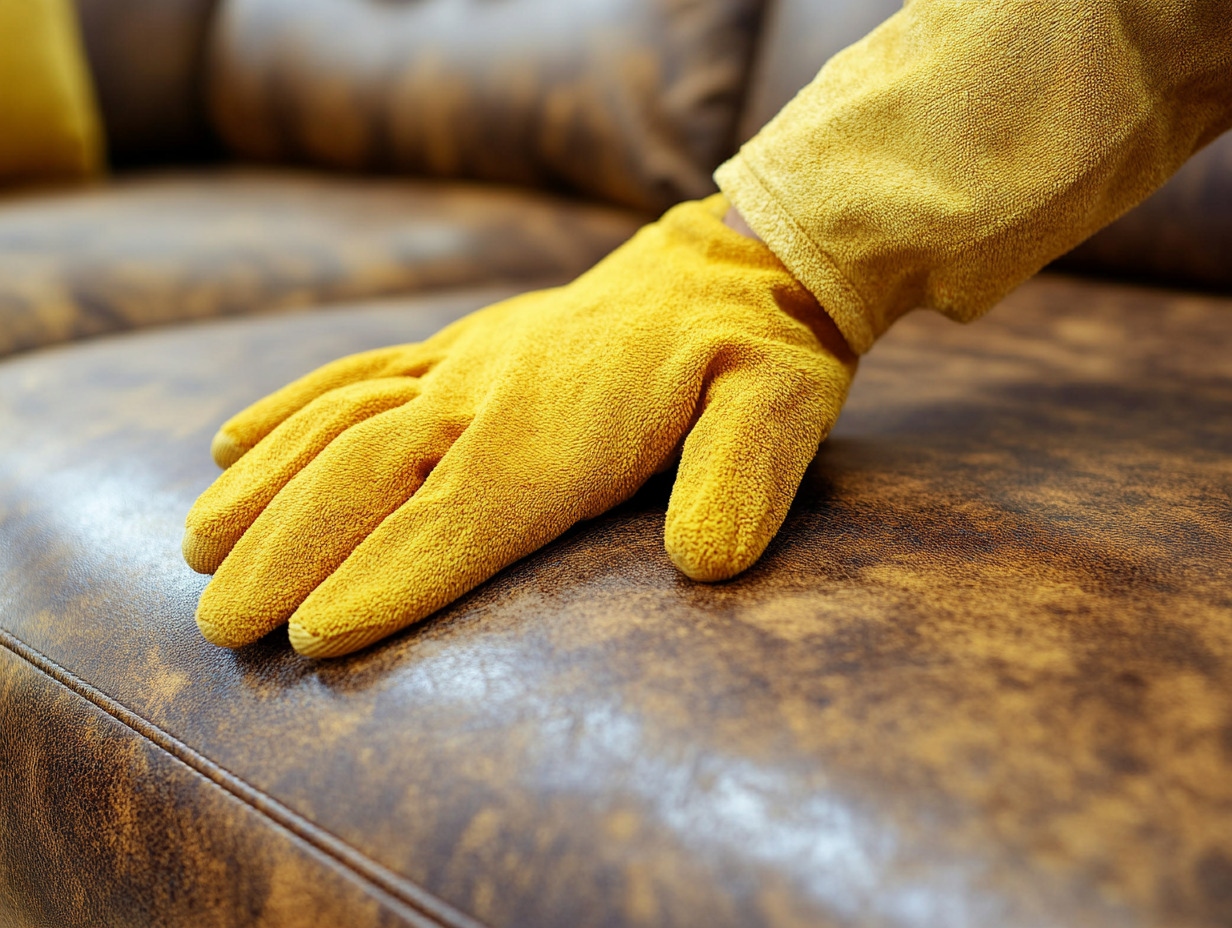
Before you start cleaning your fabric couch, it’s essential to prepare the area and gather the necessary cleaning supplies. Here are some steps to follow:
Remove Loose Items: Take off any pillows, blankets, and toys from the couch. This will give you a clear surface to work on and prevent any items from getting in the way.
Vacuum Thoroughly: Use a vacuum cleaner to go over the entire couch, paying special attention to the cushions, arms, and crevices. This will help remove dust, dirt, and any loose debris that could interfere with the cleaning process.
Check Cleaning Instructions: Look for the manufacturer’s cleaning instructions on the sofa’s tag. This will provide specific recommendations or restrictions, ensuring you don’t accidentally damage the fabric.
Gather Supplies: Collect all the necessary cleaning supplies, including a cleaning solution, a soft-bristled brush, a microfiber cloth, and baking soda if needed. Having everything on hand will make the process smoother and more efficient.
Consider Using an Upholstery Cleaning Machine: For a deeper clean, consider using an upholstery cleaning machine. This tool can help remove embedded dirt and stains more effectively.
Address Pet Stains: If you have pets, consider using a pet stain and odor remover to tackle any stubborn stains or lingering odors. This will help keep your fabric couch fresh and clean.
By following these preparation steps, you’ll be ready to clean your fabric sofa effectively and safely.
When it comes to cleaning a fabric sofa, it’s essential to understand the type of fabric and the cleaning codes provided by the manufacturer. The most common fabric types for sofas include cotton, polyester, microfiber, and suede. Each fabric type requires a specific cleaning method, and using the wrong method can damage the fabric.
The cleaning codes used by the upholstered furniture industry are:
W: Water-based cleaning agents or foam may be used, preferably distilled water.
S: Only mild, water-free cleaning solvents.
S/W: Water-based cleaning agents may be used, distilled water recommended.
X: Clean only by vacuuming or light brushing to remove soil.
It’s crucial to check the manufacturer’s instructions and the cleaning code on the care tag to ensure you’re using the correct cleaning method for your fabric sofa. This will help you avoid any potential damage and keep your upholstered furniture looking its best.
Stains on fabric sofas can be challenging to remove, but identifying the type of stain and using the right cleaning solution can make a big difference. Common stains on fabric sofas include food and drink spills, pet stains, and ink stains.
To treat stains on fabric sofas, follow these steps:
Blot the Stain: Gently blot the stain with a damp cloth to remove any excess dirt or debris. Avoid rubbing, as this can spread the stain.
Identify the Stain: Determine the type of stain you’re dealing with. This will help you choose the most effective cleaning solution.
Apply Cleaning Solution: Apply a cleaning solution specifically designed for the type of stain. Let it sit for a few minutes to break down the stain.
Blot Again: Use a clean, damp cloth to blot the stain and remove the cleaning solution. Repeat the process until the stain is removed.
Dry the Area: Allow the area to air dry completely before using the sofa again.
For tough stains, you can use a DIY cleaning solution or a commercial cleaning product specifically designed for fabric sofas. This approach will help you tackle even the most stubborn stains effectively.
Different types of fabric require different cleaning methods. Here’s a brief guide to help you understand the most common types of fabric used in couches:
Microfiber: This synthetic fabric is soft, stain-resistant, and easy to clean. Use a gentle cleaning solution and a microfiber cloth to clean microfiber couches. Avoid using harsh chemicals that could damage the fabric.
Leather: Leather is a natural fabric that requires gentle cleaning to maintain its appearance. Use a leather cleaner and a soft, dry cloth to clean leather couches. Regular conditioning can also help keep the leather supple and prevent cracking.
Suede: Suede is a delicate fabric that needs careful handling to avoid damage. Use a suede cleaner and a soft-bristled brush to clean suede couches. Be gentle to preserve the fabric’s texture and appearance.
Polyester: This durable synthetic fabric is easy to clean. Use a gentle cleaning solution and a microfiber cloth to clean polyester couches. Polyester is resistant to most stains, making it a practical choice for busy households.
Fabric: This general term covers a wide range of natural and synthetic fabrics. Use a gentle cleaning solution and a microfiber cloth to clean fabric couches. Always test the cleaning solution on a small, inconspicuous area first to ensure it doesn’t cause discoloration or damage.
Understanding the type of fabric your couch is made of will help you choose the right cleaning method and keep it looking its best.
Baking soda has been widely used to clean all kinds of stains in the house. In the case of a fabric couch, this magical white powder can also get the job done. Baking soda can remove dirty spots without damaging the sofa and also clear any unpleasant smell.
To clean the sofa, vacuum all over its surface first to wipe off the dust.
Sprinkle a layer of baking soda on the couch and use a stiff scrub to brush the surface until all the dirt is removed.
Let the baking soda sit on the couch for an hour before vacuuming it away.
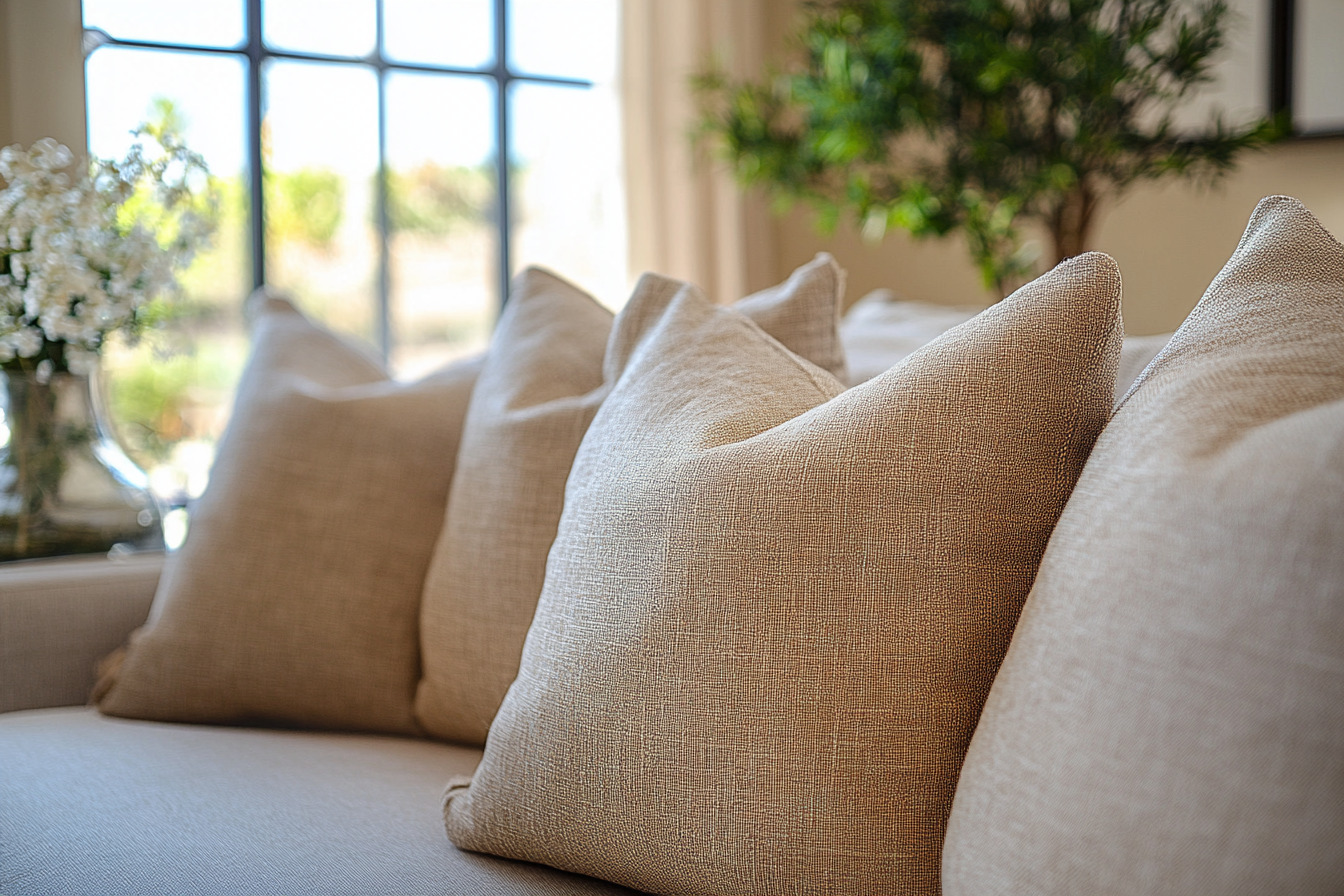
Vinegar is another natural product to clean the fabric couch without ruining it. When the vinegar is mixed with olive oil, it becomes a more effective cleaner.
Mix some vinegar and olive oil with equal portions in a spray bottle.
Apply the mixture on the couch surface and scrub it with a stiff brush for 5 minutes.
Leave the vinegar mix on the couch for a while and use a microfiber cloth to wipe off the remaining mixture.
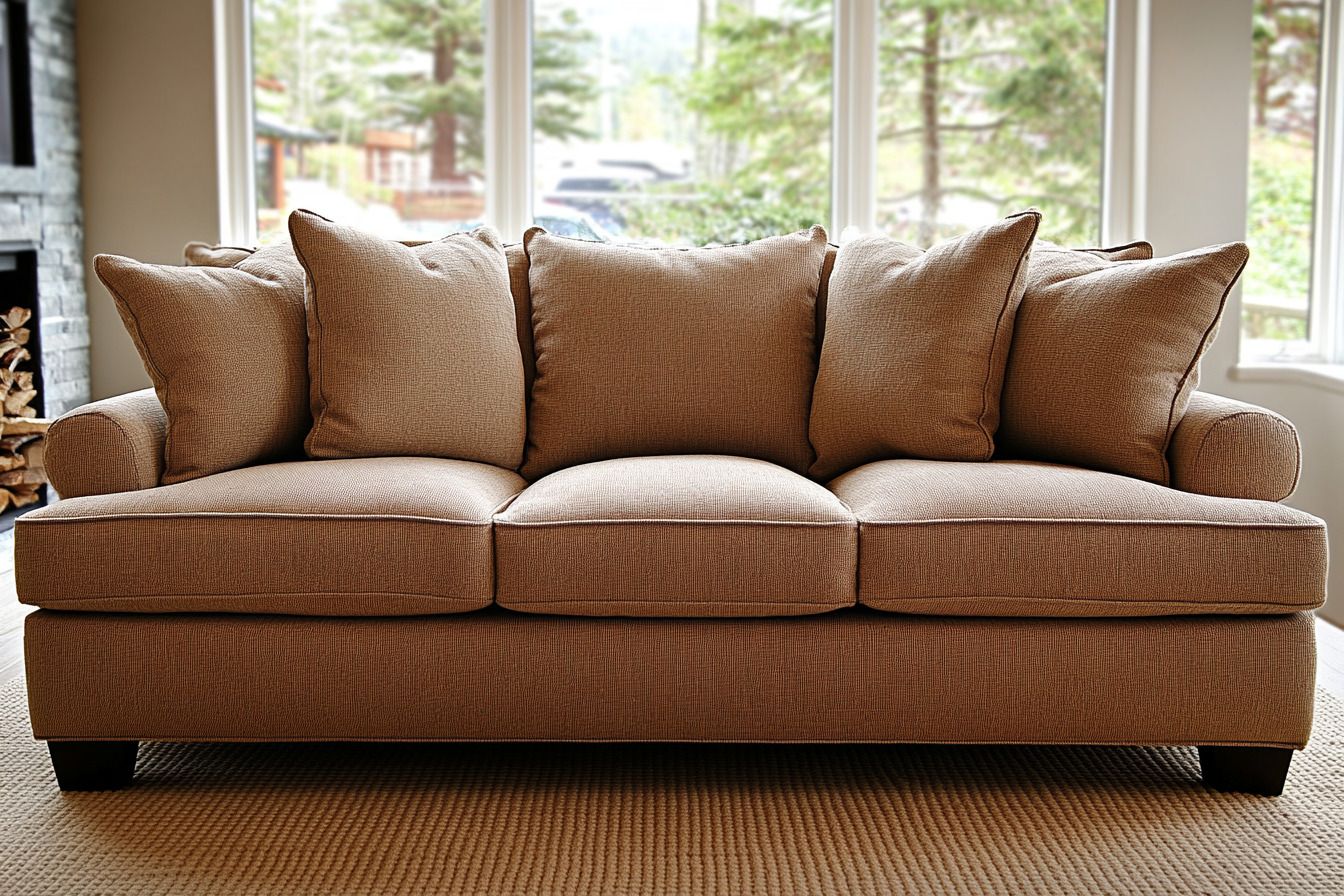
Alcohol is a stronger cleaner to cope with tougher stains if the previous methods do not clear all the grime. Before using the alcohol, read the manufacturer’s instructions to make sure that your sofa does not absorb the water inside the alcohol. Otherwise, the water may damage the couch.
Fill a spray bottle with alcohol.
Keep yourself a short distance from the spray and apply the alcohol onto the sofa. Remember to wear a face mask and gloves while doing this.
Buff the sofa surface with a rag for 5 minutes before using another clean cloth or paper napkin to wipe off the leftovers.
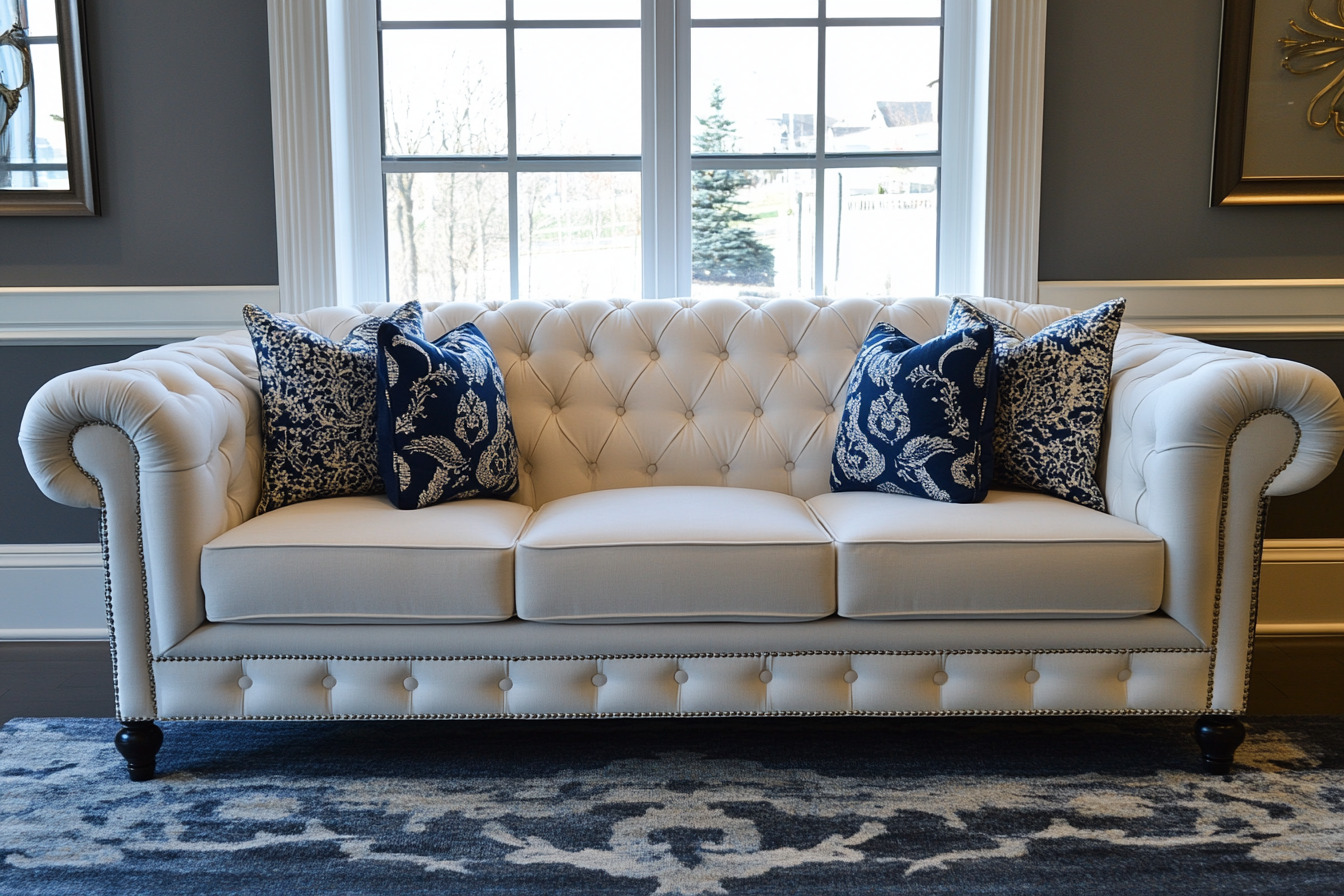
Conclusion
Fabric couches are great for house decoration at an affordable price. However, the cleaning process may be a bit trickier as water cannot be used for some types of fabric sofa.
Therefore, check the instruction tag of the fabric sofa before cleaning to make sure your cleaning method won’t damage the couch.
If the couch cannot be cleaned with water, you can use baking soda, or a mix of vinegar and olive oil as alternative measures.
For more stubborn dirt, you can also use alcohol to wipe it away. We hope this information can help you polish your sofas properly.
For more cleaning tricks and methods, please visit sparklingandbeyond.com or dial 415-966-1101 to book our cleaning services today!
As the admin of Sparkling & Beyond, I bring a wealth of knowledge and passion for excellence in the cleaning industry. With years of experience in providing top-notch cleaning solutions, I am dedicated to sharing valuable insights and tips to help maintain pristine and healthy living environments. My mission is to ensure every home and office we service sparkles with cleanliness and comfort.
1688 total views , 3 views today
Subscribe
0 COMMENTS
Related Post
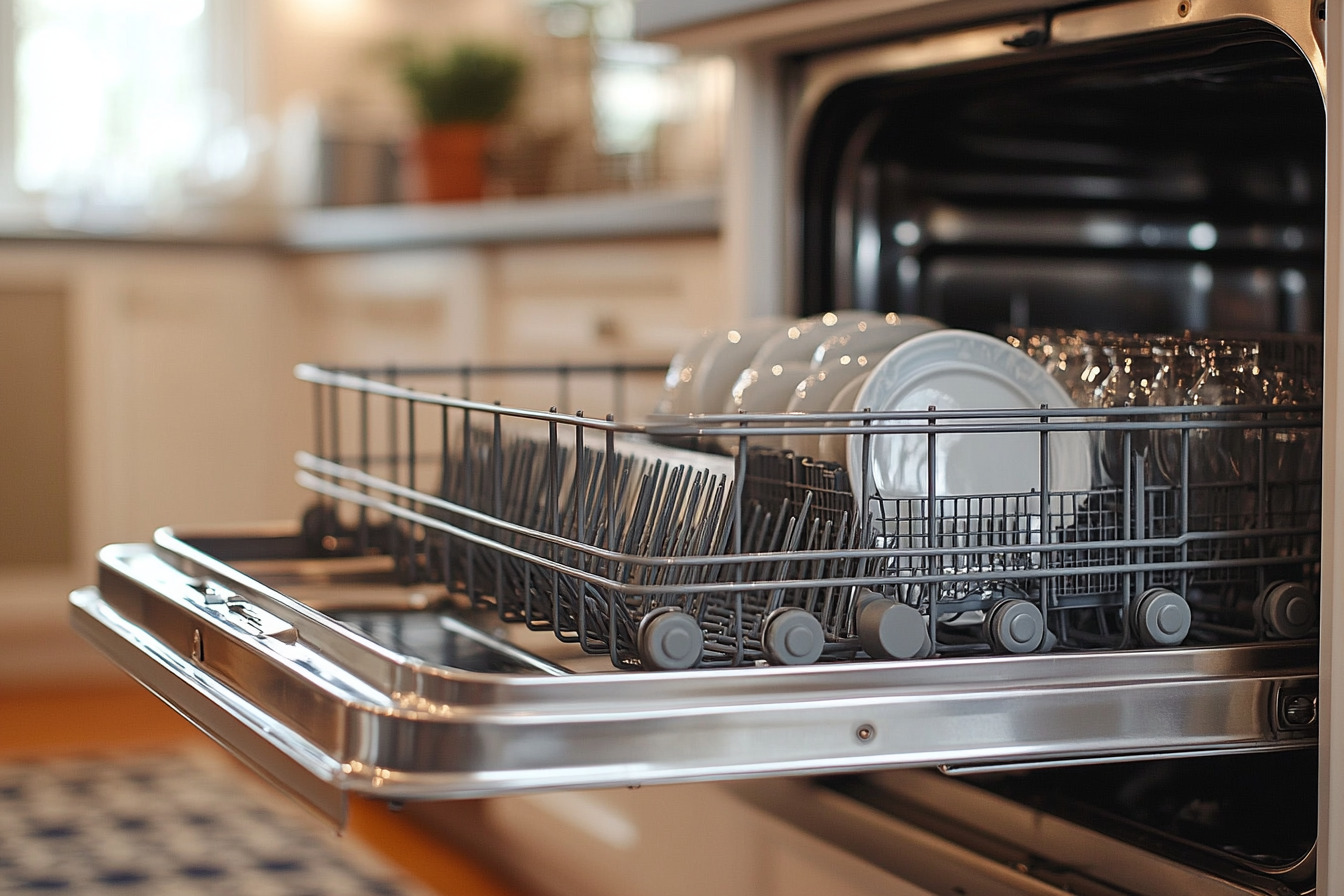
Creating a DIY cleaning solution for your fabric sofa can be a cost-effective and environmentally friendly option. Here’s a simple recipe for a DIY cleaning solution:
1 cup of water
1 tablespoon of mild soap
1 tablespoon of white vinegar
Mix the ingredients together in a spray bottle and shake well. This solution is gentle and effective for cleaning fabric sofas. Simply spray the solution onto the stained area, let it sit for a few minutes, and then blot with a clean, damp cloth. This DIY cleaner is perfect for regular maintenance and spot cleaning.
Cleaning delicate fabrics, such as suede or microfiber, requires extra care and attention. Here are some tips for cleaning delicate fabrics:
Use Gentle Solutions: Use a gentle cleaning solution specifically designed for delicate fabrics. Avoid harsh chemicals that can damage the fabric.
Soft Cloths Only: Use a soft, dry cloth to clean the fabric. Avoid rubbing or scrubbing, which can damage the delicate fibers.
Special Care for Suede: For suede fabrics, use a suede cleaning solution and a soft-bristled brush. Gently brush the fabric to remove dirt and stains without damaging the texture.
By following these tips, you can keep your delicate fabrics clean and in good condition without causing any damage.
Regular maintenance is key to keeping your sofa looking its best. Here are some tips to help you maintain your sofa:
Vacuum Regularly: Vacuum the entire sofa regularly to prevent dust and dirt from accumulating. This will help keep the fabric clean and fresh.
Spot Clean Immediately: Address spills and stains as soon as they occur to prevent them from setting in. Use a cleaning solution and a microfiber cloth to gently blot the stain, working from the outside in to avoid spreading it.
Use a Fabric Protector: Consider applying a fabric protector to repel stains and spills. This can provide an extra layer of protection and make cleaning easier.
Steam Cleaning: Steam cleaning can be an effective way to deep clean your sofa. Be sure to follow the manufacturer’s instructions and test a small area first to ensure the fabric can handle the steam. An upholstery steam cleaner can help remove deep-seated dirt and refresh the fabric. An upholstery cleaning machine can also be used for regular maintenance to keep your sofa looking its best. This tool can help remove deep-seated dirt and refresh the fabric.
DIY Couch Cleaner: For a more thorough clean, consider using a DIY couch cleaner or a professional upholstery cleaning service every 6-12 months. This will help maintain the sofa’s appearance and extend its lifespan.
By following these maintenance tips, you can keep your entire sofa looking clean and inviting for years to come.
Regular vacuuming and spot cleaning can help maintain the appearance and extend the lifespan of your fabric sofa. Here are some tips for regular vacuuming and spot cleaning:
Vacuum Weekly: Vacuum the entire sofa, including the cushions and crevices, at least once a week. This helps remove dust and dirt that can accumulate over time.
Gentle Suction: Use a handheld vacuum or a vacuum with a gentle suction setting to avoid damaging the fabric.
Immediate Spot Cleaning: Spot clean any stains or spills immediately to prevent them from setting in. Use a damp cloth to blot the stain and remove any excess dirt or debris.
By incorporating these practices into your routine, you can keep your fabric sofa looking clean and fresh every day.
Deep cleaning your fabric sofa every 6 months can help remove stubborn stains and odors and maintain its appearance. Here are some tips for deep cleaning your fabric sofa:
Choose the Right Cleaner: Use a DIY cleaning solution or a commercial cleaning product specifically designed for fabric sofas.
Apply Evenly: Apply the cleaning solution to the entire sofa, including the cushions and crevices.
Gentle Scrubbing: Use a soft-bristled brush or a cleaning cloth to gently scrub the fabric and remove any stubborn stains.
Blot and Dry: Use a clean, damp cloth to blot the fabric and remove any excess dirt or debris. Allow the sofa to air dry completely before using it again.
By following these tips and using the right cleaning solutions, you can keep your fabric sofa clean, fresh, and looking its best. Regular deep cleaning will help maintain the sofa’s appearance and extend its lifespan, ensuring it remains a beautiful and functional part of your home.
Jimmy Ho
03 Mar 2024

Jimmy Ho
19 Feb 2024

Admin
28 Jun 2022

Jimmy Ho
03 Aug 2023

Admin
26 Jan 2022

Ryan
08 Oct 2023

Jimmy Ho
28 Sep 2022
![]()
![]()
![]()
Sparkling and Beyond Cleaning Service
Our Service
Industries
Contact Us
Email: [email protected]
Monday to Sunday
8:00 AM–12:00 AM
Cleaning Tips
© 2024 Sparkling and Beyond LLC
![]()